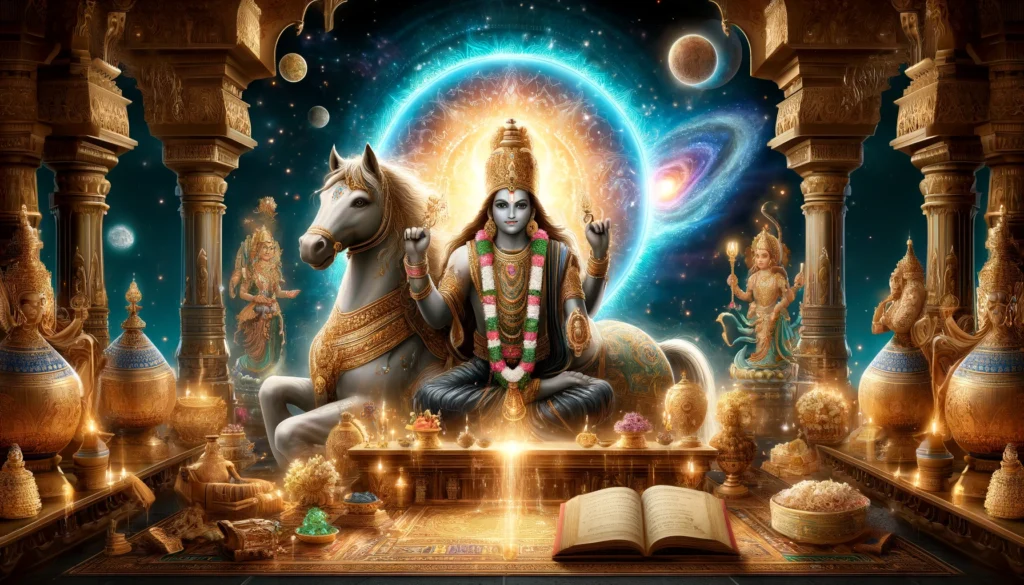Discover the profound significance of Lord Hayagriva, the horse-headed god of wisdom and knowledge in Hinduism. Explore his origins, symbolism, and relevance in modern intellectual pursuits. Learn how his teachings inspire ethical application of knowledge and spiritual growth.

Hinduism’s rich tapestry of deities encompasses countless figures, each with unique attributes, forms, and legends. Among them is Lord Hayagriva, a lesser-known yet profoundly significant deity celebrated as the embodiment of wisdom, knowledge, and enlightenment. My fascination with Hayagriva stems from his intriguing duality—both human and horse—and his role in preserving sacred knowledge. To explore the diversity of Hinduism’s wisdom, check out Hindutva Online.
This article explores the myths, symbolism, and relevance of Lord Hayagriva, delving into his origins, cultural significance, and the lessons he offers in the modern world.
The Origins of Lord Hayagriva
Lord Hayagriva is a unique deity in the Hindu pantheon, represented with a horse’s head and a human body. He is believed to have emerged from the cosmic need to restore order and wisdom. According to the Puranas, Lord Vishnu manifested as Hayagriva to retrieve the stolen Vedas, the repository of sacred knowledge, from the demon Madhu-Kaitabha.
A Mythological Overview
The story of Hayagriva is steeped in cosmic drama and divine intervention. It is said that after creating the universe, Brahma lost the Vedas due to the trickery of demons. Vishnu, in his Hayagriva form, defeated these forces of ignorance and restored the Vedas to their rightful place. This act established Hayagriva as a guardian of knowledge and the divine force against chaos.
The Iconography of Hayagriva
The form of Hayagriva is symbolic, blending the power of the horse with the intellect of the human. His horse head signifies speed, determination, and nobility, while his human torso reflects wisdom and compassion. Hayagriva is often depicted seated on a lotus, symbolizing purity and enlightenment, and holding sacred scriptures and rosary beads.
Cultural Significance
Lord Hayagriva holds a prominent place in Hinduism, especially in South India. His worship is prevalent among students, scholars, and those seeking intellectual growth. Temples dedicated to Hayagriva, such as the Parakala Matha in Mysore and the Hayagriva Madhava Temple in Assam, are focal points for devotees.
Hayagriva and Education
As a child, I vividly remember reciting prayers to Hayagriva before exams, seeking clarity and focus. This ritual, taught by my grandmother, was more than a prayer—it was a grounding moment that connected me to the divine and boosted my confidence.
The Spiritual Symbolism
Hayagriva’s story resonates on multiple levels:
- Victory of Knowledge Over Ignorance: His retrieval of the Vedas symbolizes the triumph of wisdom over darkness.
- Discipline and Focus: The horse-headed form encourages speed in thought and precision in actions.
- Divine Guidance: Hayagriva’s presence assures that knowledge, when used righteously, can overcome any obstacle.
To learn about the deeper spiritual significance, explore Learn Religions.
Lessons for the Modern World
In today’s era of information overload, Hayagriva’s teachings are more relevant than ever. He reminds us to discern between true wisdom and mere data, urging a balanced approach to learning. His attributes inspire focus, ethical application of knowledge, and the pursuit of higher truths.
Rituals and Festivals
Worship Practices
Hayagriva is often worshipped with offerings of flowers, fruits, and scholarly tools like pens and books. Devotees recite the Hayagriva Stotra, composed by Vedanta Desika, to invoke his blessings.
Hayagriva Jayanti
The birthday of Hayagriva is celebrated with fervor, particularly in Tamil Nadu and Andhra Pradesh. Rituals include recitation of Vedic hymns, scholarly discussions, and distribution of prasadam (consecrated food).
Hayagriva Across Cultures
Interestingly, the concept of a horse-headed deity is not confined to Hinduism. Similar figures appear in Tibetan Buddhism as Tamdrin and in ancient Greek mythology as Chiron. This cross-cultural presence underscores the universal appeal of Hayagriva’s attributes.
Incorporating Hayagriva’s Teachings
Incorporating Hayagriva’s lessons into daily life can lead to greater clarity and purpose. Here are some practical steps:
- Dedicate a space for study and reflection, invoking Hayagriva for guidance.
- Practice discernment in information consumption, distinguishing between superficial knowledge and deeper understanding.
- Embrace lifelong learning as a spiritual journey.
Connecting to the Divine
My personal connection to Hayagriva deepened during a visit to the Parakala Matha temple. Witnessing the serene statue of Hayagriva, surrounded by scriptures, was a humbling experience that reinforced my faith in the transformative power of wisdom.
Criticism and Misconceptions
While Hayagriva is venerated as a god of knowledge, some critics argue that such symbolism oversimplifies the challenges of intellectual growth. However, this view overlooks the deeper spiritual framework that Hayagriva represents—one that integrates learning with ethics and devotion.
For more practical applications of spiritual teachings, visit Art of Living.
Lord Hayagriva stands as a beacon of wisdom, reminding us that true knowledge transcends the mundane and connects us to the divine. His story, rich in mythological and spiritual significance, inspires seekers to pursue wisdom with integrity and focus.
Author:
Dr. Aryan Mishra – Historian & Cultural Analyst

